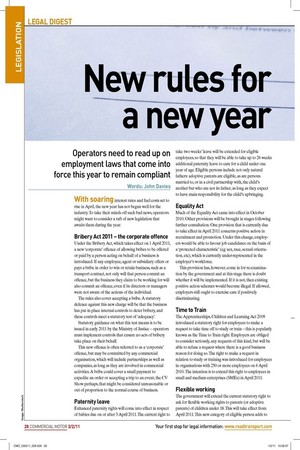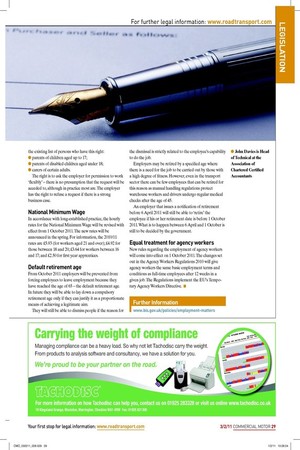New rules for a new year
Page 23

Page 24

If you've noticed an error in this article please click here to report it so we can fix it.
Operators need to read up on employment laws that come into force this year to remain compliant
Words: John Davies With soaring interest rates and fuel costs set to rise in April, the new year has not begun well for the industry. To take their minds off such bad news, operators might want to consider a raft of new legislation that awaits them during the year.
Bribery Act 2011 – the corporate offence
Under the Bribery Act, which takes effect on 1 April 2011, a new ‘corporate’ offence of allowing bribes to be offered or paid by a person acting on behalf of a business is introduced. If any employee, agent or subsidiary offers or pays a bribe in order to win or retain business, such as a transport contract, not only will that person commit an offence, but the business they claim to be working for will also commit an offence, even if its directors or managers were not aware of the actions of the individual.
The rules also cover accepting a bribe. A statutory defence against this new charge will be that the business has put in place internal controls to deter bribery, and these controls meet a statutory test of ‘adequacy’.
Statutory guidance on what this test means is to be issued in early 2011 by the Ministry of Justice – operators must implement controls that ensure no acts of bribery take place on their behalf.
This new offence is often referred to as a ‘corporate’ offence, but may be committed by any commercial organisation, which will include partnerships as well as companies, as long as they are involved in commercial activities. A bribe could cover a small payment to expedite an order or accepting a trip to an event, the CV Show perhaps, that might be considered unreasonable or out of proportion to the normal course of business.
Paternity leave
Enhanced paternity rights will come into effect in respect of babies due on or after 3 April 2011. The current right to take two weeks’ leave will be extended for eligible employees, so that they will be able to take up to 26 weeks additional paternity leave to care for a child under one year of age. Eligible persons include not only natural fathers: adoptive parents are eligible, as are persons married to, or in a civil partnership with, the child’s mother but who are not its father, as long as they expect to have main responsibility for the child’s upbringing.
Equality Act
Much of the Equality Act came into effect in October 2010. Other provisions will be brought in stages following further consultation. One provision that is currently due to take effect in April 2011 concerns positive action in recruitment and promotion. Under this change, employers would be able to favour job candidates on the basis of a ‘protected characteristic’ (eg: sex, race, sexual orientation, etc), which is currently under-represented in the employer’s workforce.
This provision has, however, come in for re-examination by the government and at this stage there is doubt whether it will be implemented. If it is not, then existing positive action schemes would become illegal. If allowed, employers still ought to exercise care if positively discriminating.
Time to Train
The Apprenticeships, Children and Learning Act 2009 introduced a statutory right for employees to make a request to take time off to study or train – this is popularly known as the Time to Train right. Employers are obliged to consider seriously, any requests of this kind, but will be able to refuse a request where there is a good business reason for doing so. The right to make a request in relation to study or training was introduced for employees in organisations with 250 or more employees on 6 April 2010. The intention is to extend this right to employees in small and medium enterprises (SMEs) in April 2011.
Flexible working
The government will extend the current statutory right to ask for lexible working rights to parents (or adoptive parents) of children under 18. This will take effect from April 2011. This new category of eligible person adds to the existing list of persons who have this right: ● parents of children aged up to 17; ● parents of disabled children aged under 18; ● carers of certain adults.
The right is to ask the employer for permission to work ‘lexibly’ – there is no presumption that the request will be acceded to, although in practice most are. The employer has the right to refuse a request if there is a strong business case.
National Minimum Wage
In accordance with long-established practice, the hourly rates for the National Minimum Wage will be revised with effect from 1 October 2011. The new rates will be announced in the spring. For information, the 2010/11 rates are £5.93 (for workers aged 21 and over); £4.92 for those between 18 and 20; £3.64 for workers between 16 and 17; and £2.50 for irst year apprentices.
Default retirement age
From October 2011 employers will be prevented from forcing employees to leave employment because they have reached the age of 65 – the default retirement age. In future they will be able to lay down a compulsory retirement age only if they can justify it as a proportionate means of achieving a legitimate aim.
They will still be able to dismiss people if the reason for the dismissal is strictly related to the employee’s capability to do the job.
Employers may be retired by a speciied age where there is a need for the job to be carried out by those with a high degree of itness. However, even in the transport sector there can be few employees that can be retired for this reason as manual handling regulations protect warehouse workers and drivers undergo regular medical checks after the age of 45.
An employer that issues a notiication of retirement before 6 April 2011 will still be able to ‘retire’ the employee if his or her retirement date is before 1 October 2011. What is to happen between 6 April and 1 October is still to be decided by the government.
Equal treatment for agency workers
New rules regarding the employment of agency workers will come into effect on 1 October 2011. The changes set out in the Agency Workers Regulations 2010 will give agency workers the same basic employment terms and conditions as full-time employees after 12 weeks in a given job. The Regulations implement the EU’s Temporary Agency Workers Directive. ■













































